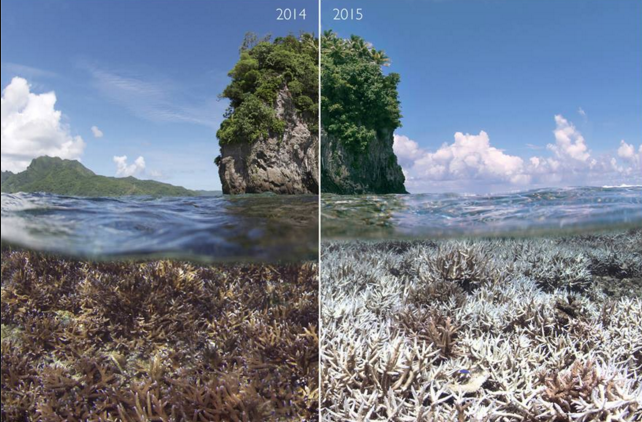Written while debuting Google’s new virtual reality goggles
While today was our shortest day at Le Bourget, it was definitely not lacking in substance. We attending a highly engaging discussion about the destruction of coral reefs around the world, and learned that if the world warms more than 2 degrees C, we will lose the majority of functioning coral reefs, including the Great Barrier Reef, by 2050. The vast ocean acts as a tremendous carbon sink, but the exponential increase in carbon emissions is acidifying our oceans to deadly levels. Ocean acidification kills not only coral reefs, but all the fish and marine life that depend on reefs as habitat. These implications extend all the way up the food chain and into vulnerable communities who depend on these ecosystems for food and economic sustenance.

To the left is the American Samoa reef in 2014, and to the right is the reef just one year later, completely bleached and dead due to acidification and warming. Photo from XL Catlin Survey
According to one of the five scientists on the panel, the ocean is often called the “invisible world”. He explained that there is a troubling disconnect between landlocked people and the ocean. It is problematic that politicians, world leaders, the mainstream media, etc. aren’t going out into these massive reefs and seeing them bleach and disappear before their very eyes, and therefore it doesn’t appear as a problem in need of addressing. Many of these influential people aren’t going into small coastal communities where children can no longer go to school because their families need them to help them find new sources of food because of declining fish stocks. So to help combat this problem and to share the beauty and tragedy of ocean acidification, Google and the Catlin Seaview Survey teamed up to unveil a new virtual technology mechanism to allow students and others the opportunity to explore our threatened underwater ecosystems. We lifted the goggles to our eyes as the press went crazy and documented all of these well dressed people holding boxes over their eyes looking wildly around the room. You can take a virtual dive yourself here!
We appreciate their technological fix to try to make the beauty and the importance of the oceans accessible to everyone. When people ask us why we care so much about climate change or the environment, it typically comes back to our experiences. We want to protect the generous snowfall in the mountains, keep our favorite beaches clean and free of erosion, ensure the longevity of the beautiful wilderness.
But beyond wanting to “save the environment” for our skiing and surfing pleasures, I think people often forget how dependent we are on a stable climate. The human species could not survive on this planet if it weren’t for the delicate composition of our atmosphere, the ideal temperatures that let us grow our food, the availability of fresh water, the existence of rich soil. Ocean acidification is not just a problem reserved for scientists and diving enthusiasts, it threatens billions of people whose livelihoods depend on those reefs. We aren’t just pushing for carbon emissions to save the future of skiing, but we’re fighting to save the functionality of the ecosystems that are so inconceivably complex and intertwined into our lives and are vital to our very existence.
While there has been incredible momentum in Paris towards taking action on climate change, progress back home has been limited. This week, Congress passed two bills aimed at preventing the Environmental Protection Agency from regulating corporate emissions. On Tuesday, the Republican-controlled House voted to block EPA’s Clean Power Plan, which requires the power sector to cut emissions by 32% from 1990 levels. While Obama has announced that he will veto this resolution, the lack of support coming from Congress on the issue of climate change is disappointing, particularly in light of the talks happening here. Just before the vote, Republican Ed Whitfield said, “we wanted the House to adopt this resolution while the climate change conference is going on in France so that the world will know that in America there is disagreement about the extreme power grab that this president is initiation under his clean energy plan.” This attitude mimics that of Congress in 1997, when the Senate voted against joining the Kyoto Protocol. This global treaty acknowledged the existence of climate change and set legally binding targets for lowering emissions. When the US became one of the only developed countries to reject the treaty, it sent the message internationally that it did not take the climate crisis seriously and did not plan on contributing its fair share in addressing it. This time around, we can only hope that international and domestic pressure will overcome congressional resistance, to push for greater climate commitments from the US government.
Update from the delegations:
-
Sustainable agriculture is really starting to catch wind as a pressing topic here at the conference. Negotiators are forced to face how to deal with the demand for food worldwide and exactly how we are using the land allocated to food production, knowing that the majority of it goes towards animal feed instead of billions of starving people
-
Climate change is a big, confusing problem to tackle, but what makes it even more mind boggling is all of the acronyms and complex jargon associated with it. Transparency is essential to the talks here in Paris, and the public is beginning to demand more from the negotiations and what exactly is being done, so not to repeat another flop like the 2009 talks in Copenhagen
-
United Nations Secretary General Ban Ki Moon was quoted today saying, “there is no perfect solution,” urging his associates to focus on compromise, progressing step-by-step and accepting every advancement as a victory



Leave a Reply